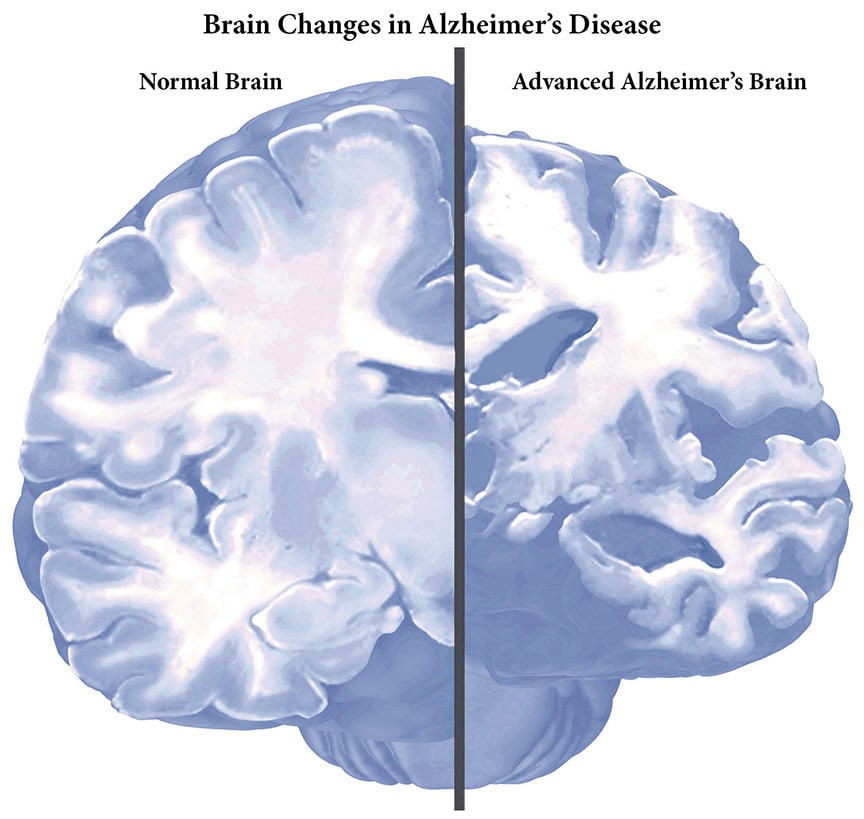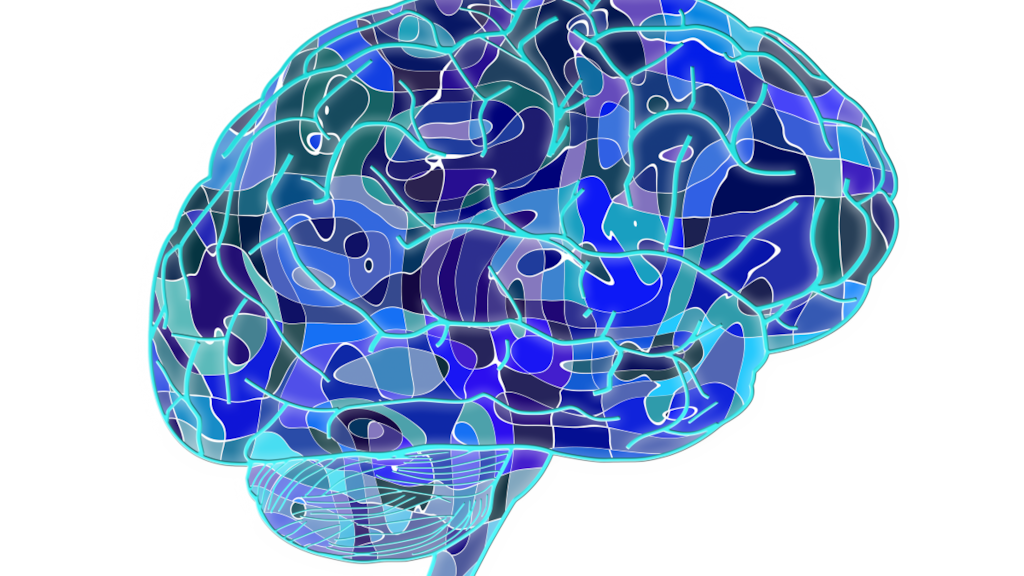
Alzheimer’s disease is a brain disease. It destroys memory and thinking skills and causes personality changes. Alzheimer’s disease is a type of dementia.
Dementia is a general term for a decline in mental ability that gets bad enough to interfere with daily life. Alzheimer’s usually begins after age 60, but sometimes affects younger people.
The Alzheimer’s Association lists these 10 early warning signs of Alzheimer’s disease:
- Memory loss that disrupts daily life
- Challenges in planning or solving problems
- Difficulty completing familiar tasks at home, at work, or at leisure
- Confusion with time or place
- Trouble understanding visual images and spatial relationships
- New problems with words in speaking or writing
- Misplacing things and losing the ability to retrace steps
- Decreased or poor judgment
- Withdrawal from work or social activities
- Changes in mood and personality
The symptoms of Alzheimer’s
The symptoms of Alzheimer’s disease tend to start out small and get worse over time.
- In the earliest stages, you may have trouble recalling new or recent memories, or learning and retaining new information.
- As Alzheimer’s disease gets worse, even older memories fade.
- You may have trouble telling others what you are thinking, carrying out simple instructions, and recognizing familiar faces or well-known objects.
- It may be difficult to plan meals, manage money, remember to take medicines, or find your way around, even in a familiar place.
- In late stages, delusions or hallucinations can begin. Delusions are irrational beliefs, especially about being wronged or having belongings stolen.
- A person with hallucinations may believe he or she sees, hears, smells, tastes, or is being touched by someone or something that isn’t really there.
- People with Alzheimer’s disease can become agitated, angry, and abusive.
- Some people wander away from home.
- Many people with Alzheimer’s disease also have personality changes and can become irritable, anxious, or depressed.
Why does Alzheimer’s happen?
No one knows why this happens to some people and not to others.
The brains of people with Alzheimer’s disease have abnormal clumps of protein called amyloid plaques (AM-uh-loid placks) and tangled bundles of fibers. The brain cells also lose connections with each other.

Forgetfulness
What’s normal and what’s not?
Most people forget things, especially as they get older.
These signs are probably normal forgetfulness:
- You forget the name of a friend you haven’t seen in years.
- You can’t find your car keys.
- You get lost while driving to a new doctor’s office.
- You forget to balance the checkbook one month.
- You forget what you ate for dinner last night, but you remember as soon as someone gives you a clue.
- You forget to take your pills on time.
- You have occasional difficulty finding words.
- You can operate common appliances even if you are unwilling to learn how to operate new devices.
- You joke about your own forgetfulness to friends and family members.
There are important differences between normal forgetfulness and Alzheimer’s disease or dementia.
Consider talking to your doctor if:
- You struggle to remember the name of a family member who you see every week.
- You have trouble remembering how to drive.
- You get disoriented while driving to a familiar location and can’t figure out where to go.
- You forget to pay the bills month after month.
- You forget what you ate for dinner last night and no reminders can jog your memory.
- You forget to take your pills for several days in a row.
- You make frequent word-finding pauses and substitutions.
- You cannot operate common appliances, and are unable to learn to operate new devices.
- A spouse or family member expresses concern about your memory lapses.
How is Alzheimer’s diagnosed?
Some people with Alzheimer’s recognize that they are having problems with memory.
Others don’t notice there is a problem. Family members and close friends see the forgetfulness and changes in behavior and sound the alarm.
There is no single test to show that someone does, or does not, have Alzheimer’s disease. Diagnosing it starts with identifying symptoms of Alzheimer’s and trying to determine if they might be caused by something else.
Many things can cause forgetfulness, confusion, and inattentiveness besides Alzheimer’s disease. For example, very low levels of vitamin B12 or a very underactive thyroid gland can cause these problems. Fortunately, they usually can be corrected with simple treatments.
Treating Alzheimer’s disease
So far, there is no cure for Alzheimer’s.
The goal of treatment is to improve symptoms and slow the worsening of the disease.
The U.S. Food and Drug Administration has approved several drugs for people with Alzheimer’s. These drugs modestly improve memory and thinking skills, like the ability to make decisions or exercise judgment.
These drugs work best in people with mild to moderate Alzheimer’s disease. They don’t work very well in people with severe Alzheimer’s disease.
Other drugs can be used to ease symptoms of:
- depression
- anxiety
- delusions
- aggression
- emotional and behavioral problems
- loss of appetite
- reduced energy level
- difficulty sleeping
- inability to function socially
Special precautions for wanderers
Keeping an individual with Alzheimer’s disease safe is a heavy responsibility. One of the most dangerous and distressing symptoms of Alzheimer’s is wandering.
Simple measures like covering doorknobs with childproof knobs or placing warning bells on doors can help prevent someone with Alzheimer’s from leaving the house. Have a recent, close-up photograph of your loved one available, in case he or she does wander. You can also buy identification jewellery engraved with “memory impaired” and your loved one’s name, address, and phone number.
Tips for coping with daily routines
These tips can help people with Alzheimer’s disease and their caregivers:
Communication
- Use simple words and short sentences.
- Be patient. Give the person time to complete a thought. Try not to interrupt.
Bathing
- Use rubber tub mats, tub seats, grab bars, and nonslip bathmats.
- Remove the lock from the bathroom door.
- Prepare everything in advance. Lay out towels, soap, shampoo, and clothes.
- Check the person’s skin for rashes and sores.
Dressing and grooming
- Choose simple clothing the person can manage easily without help.
- Elastic and Velcro are easier than buttons, hooks, snaps, and ties.
- Don’t insist that the person choose what to wear. Lay out clothing in the order that it should be put on.
- The abilities of someone with Alzheimer’s can change day to day, or hour to hour.
Mealtimes
- Don’t serve food or drinks that are too hot.
- Remind the person to eat slowly and chew each bite thoroughly.
- Cut food into small pieces.
Toileting
- Put a colourful sign on the bathroom door to make it easy to find.
- If the person can’t control his or her urine or bowel movements, use disposable pads or briefs and waterproof mattress coverings.
- Try to be calm and understanding when accidents occur.
Activity
- Provide opportunities for exercise, outdoor walks, and rides in the car.
- Focus on variations of activities the person enjoyed before becoming ill. If he or she liked cooking, for instance, he or she may be able to wash vegetables.
Support for caregivers
Caring for someone with Alzheimer’s can be deeply rewarding. But it can be difficult, physically and emotionally. No matter how much you love that person, caregiving can be a tough, lonely job at times.
Support may come in many guises. A combination of caring family, friends, and neighbors—and professional or government services—often helps.
Find time for yourself
- Try your local agency on aging to find out what resources, including respite care, are available.
- Talking with a geriatric-care manager or social worker may quickly identify some helpful options.
Ask for help
- Sometimes getting a few promises in place— to handle driving to medical appointments or dinners on specific days—makes a big difference.
- Tap into religious communities. A religious or spiritual community can be a strong source of assistance if you or the person you are caring for belongs to one.
Lean on friends
- Friends who listen—and offer advice only when you ask directly—are invaluable. Ask outright if you can use them as a sounding board whenever the need arises.
Caring for someone with Alzheimer’s
Caring for a person with Alzheimer’s can be difficult and demanding on family and other loved ones.
It’s important to make sure the home is safe. Walk around the home noting—and fixing—any hazards.
- Move or remove extension cords or throw rugs, which can cause trips and falls.
- Make sure all stairs have sturdy handrails and good lighting. Keep a night light on in the bedroom, hallway and bathroom.
- Lower the temperature on water heaters to prevent burns. Hide stove knobs or use childproofing knobs.
- Keep cleaning supplies and other poisons out of reach or stored in cabinets with childproof latches. Do the same for firearms, sharp knives, razors and scissors.
Contact the Alzheimer’s Foundation at www.alz.org for additional information.
Your doctor’s questions
Your doctor will ask questions about your general health, symptoms, and the health of close family members.
These questions might include:
- How long have you been having memory problems?
- Did memory loss come on gradually or suddenly?
- What sorts of things have become hard to remember?
- Are your difficulties preventing you from doing ordinary things like cooking or paying the bills?
- Does one of your parents, a brother or sister, or other close relative have Alzheimer’s disease?
If you are unable to answer these questions yourself, your doctor may ask a family member.
Your doctor may refer you to a neuropsychologist. This type of doctor will check your attention, memory, reasoning, executive function, language, spatial ability, and mood.
You may also have a brain scan. This is mostly done to see if other brain problems might be causing memory loss and other symptoms.


